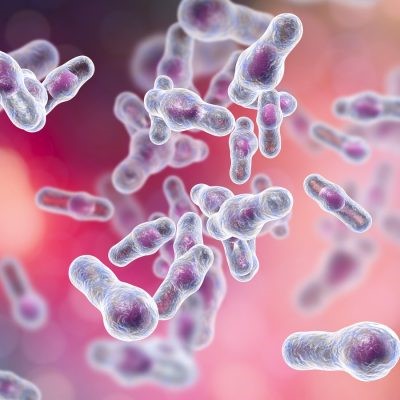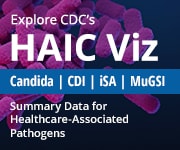
Graedon, Terry. 2018. Clostridium Difficile Infection [Internet]. The People’s Pharmacy;[cited 2019 August 31]. Avaliable from https://www.peoplespharmacy.com/articles/c-diff-infections-are-no-longer-limited-to-hospitals/
Overview
CEIP conducts surveillance for Clostridioides difficile infection (CDI) through Healthcare-Associated Infections Community Interface. For each case of invasive disease in the study population, CEIP generates a case report with basic demographic information.
Objectives
- Monitor population-based CDI incidence and disease burden of community- and healthcare-associated CDI over time to assess the impact of prevention strategies and inform public health practice
- Describe the molecular and microbiologic characteristics of difficile strains causing disease in the population under surveillance and describe changes in strain prevalence over time
- Monitor changes in the epidemiology of community- and healthcare-associated CDI, including disease severity, related complications and outcomes, and relevant risk factors to help guide prevention efforts
Main Components
- The main components of CDI surveillance are active, laboratory-based surveillance, stool testing at CDC for confirmatory results, and monthly transmission of data to CDC.
Surveillance Methods
Case definition:
A case of CDI is defined as a stool positive for C. difficile toxin by either enzyme immunoassay or molecular assay (e.g., PCR) on an incident stool specimen from a resident of San Francisco County. Cases that have a positive stool specimen for C. difficile toxin greater than eight weeks after the last positive specimen will be considered as an incident case of CDI. Therefore, for surveillance purposes, an individual may be classified and captured as a new incident case if eight consecutive weeks have elapsed since their last positive test for C. difficile.
Initial case classification:
A CDI case will be categorized as healthcare facility-onset (HCFO) if the initial specimen that yielded the positive C. difficile toxin result was collected > 3 calendar days after admission to a healthcare facility (e.g., acute care hospital, long-term acute care hospital, long-term care facility). A CDI case will receive healthcare facility categorization as community-onset (CO) if the initial specimen that yielded the positive C. difficile toxin result was collected in an outpatient setting or within the first three calendar days of a healthcare facility admission.
Secondary case classification:
Among CO cases, cases will be further classified either as community-onset healthcare facility-associated (CO-HCFA) or community-associated (CA). CO cases who had an overnight stay at a healthcare facility in the twelve weeks prior the initial specimen that yielded the positive C. difficile toxin result will be classified as CO-HCFA; whereas CO cases with no documented overnight stay in a healthcare facility in the twelve weeks prior the initial specimen that yielded the positive C. difficile toxin result will be classified as CA.
Recurrent episodes:
CDI cases that have a positive stool specimen for C. difficile from two to eight weeks of the last positive specimen will be considered as a recurrent episode of CDI.
Duplicate episodes:
CDI cases that have a positive stool specimen for C. difficile within two weeks of the last positive specimen will be considered as a duplicate episode.
Data Overview
Yearly surveillance reports for pathogens under surveillance are available in PDF format at CDC’s HAIC CDI Surveillance Reports site.
Publications
Garcia EP, Parker E, Nadle J, Winston LG. Clostridium difficile infection (CDI) treatment practices in San Francisco County, 2012. Poster presented at: ID Week 2013. 2nd Annual Joint Meeting of IDSA, SHEA, HIVMA, and PIDS; 2013 Oct 2-6; San Francisco, CA.
Garcia EP, Parker E, Nadle J, Winston LG. Clostridium difficile infections among San Francisco county residents, 2010-2011. Poster #339 presented at: ID Week 2012. 1st Annual Joint Meeting of IDSA, SHEA, HIVMA, and PIDS; 2012 Oct 16-21; San Diego, CA.
Links
- CDI Surveillance
- CDC CDI Infections
- CDI Surveillance Reports
- EIP CDI Publications
- CDPH CDI Information
Additional CDI information
CDC CDI Information: http://www.cdc.gov/HAI/organisms/cdiff/Cdiff_infect.html
CDC CDI Tracking and Annual Reports: http://www.cdc.gov/hai/eip/clostridium-difficile.html
California Department of Public Health CDI:
https://www.cdph.ca.gov/Programs/CHCQ/HAI/Pages/C.difficile(C.diff,CDI).aspx
Contact
For questions about CDI surveillance and projects, please contact:
Joelle Nadle, MPH
Project Coordinator, HAIC and MRSA
HAIC@ceip.us

